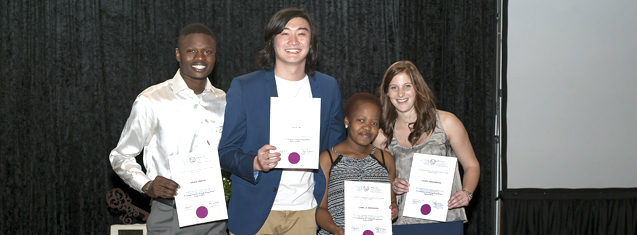Latest News Archive
Please select Category, Year, and then Month to display items
10 March 2022
|
Story Anthony Mthembu
|
Photo Unsplash
 The No Student Hungry team gearing up to start distributing food parcels to the selected students.
The No Student Hungry team gearing up to start distributing food parcels to the selected students.
The UFS is one of the many institutions of higher learning where food insecurity is an active issue. However, the
No Student Hungry Programme is one of the initiatives launched at the university to assist in fighting food insecurity at the institution.
The purpose of the programme
Since its inception in 2011, the initiative has assisted many students in acquiring a healthy meal. Additionally, the Food Environment Office also hands out food packages, so that students can continue to achieve academically. “We are trying to develop a healthy environment for students and make it easier for them to have a nice and healthy meal,” stated Annelize Visagie, who heads the Food Environment Office at the UFS. The Food Environment programme is spread out on all three campuses, each with its own facilitators. Furthermore, the programme mainly caters for students who are not funded by the National Student Financial Aid Scheme (NSFAS) but who are excelling academically. The abovementioned students apply for assistance online, and a list is then drawn up of students who receive assistance for the year.
Alternative solutions to keep the initiative running
On the Bloemfontein Campus, the No Student Hungry Programme will be catering for 200 students in the 2022 academic year, assisting them with a daily nutritious meal. Additional food parcels are also handed out to provide further assistance. “We give food parcels to the students on the list every Tuesday and Thursday at the Thakaneng Bridge,” Visagie highlighted. However, she argues that catering for the student population through this programme can be a challenge, as the demand for assistance is growing rapidly and the ability to assist is limited. The programme relies on partnerships and sponsors to assist the student body. In fact, the coordinators of the programme currently have a memorandum of understanding with Tiger Brands according to which they deliver around 100 food parcels for distribution.
In addition, the coordinators have put in place alternative measures to ensure that they can provide more food to students. “The
Kovsie Act Office, in partnership with the
Department of Sustainable Food Systems and Development, has started a food garden where healthy and nutritious produce are grown, in order to add value to the distribution,” she indicated. Although the programme can only assist to a point, students who are in desperate need of assistance are never turned away. In fact, the
Social Support Unit at Thakaneng Bridge usually assists students with food vouchers for a maximum of four days.
A commitment to teaching healthy eating habits
The programme is not only committed to curbing food insecurity, but also to ensuring that students have a healthy and balanced diet. As such, a booklet is being issued by the
Department of Nutrition and Dietetics in collaboration with the Department of Sustainable Food Systems and Development, which contains ways in which students can make a healthy meal using some of the ingredients offered in the food parcels.
“We want to teach students how to eat healthy in the cheapest way, because they don’t have a lot of money to buy expensive food products,” Visagie argued.
Leadership for Change celebrates graduation ceremony
2014-10-15

The Leadership for Change Programme hosted its third annual graduation ceremony on 9 October 2014 at the Centenary Complex on the Bloemfontein Campus.
The event consisted of two segments. The first was aimed at the group who has travelled abroad during the past year. They were presented with special certificates acknowledging the work they have done during their participation in the programme.
The second element of the evening was to wish the 2014/2015 group all of the best for their upcoming travels. This group will be travelling abroad during next year. Of the 250 applicants, the top 32 students were chosen to be part of the Leadership for Change Programme.
Prof Jonathan Jansen, Vice-Chancellor and Rector, said, “I hope you came back with the capacity to distinguish right from wrong – not only through law, but morally as a leader.”
Waldo Staude, Vice-president of the Student Representative Council (SRC), acted as Chair to the evening’s proceedings. He is also an alumnus of this programme.
“This programme has made its mark as we observe the number of leadership positions our students from the programme hold on this campus,” Staude said. “We have eight Leadership for Change students in the SRC for the 2014/15 term.”
The Leadership for Change Programme each year gives first-year students exposure to top universities throughout the world. Its focus is to establish a new campus culture of student relations across boundaries.
Six cohort groups – of between five to six students each – will visit universities on three different continents in January 2015. Each group will be accompanied by a UFS staff member serving the role of mentor.
The universities they will be visiting (according to continent), are:
USA
Cleveland State University
University of Minnesota
University of Vermont
Europe
The Netherlands: Vrije University in Amsterdam
Belgium: University of Antwerp and Ghent University
Asia
Japan: International Christian University